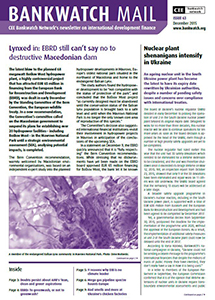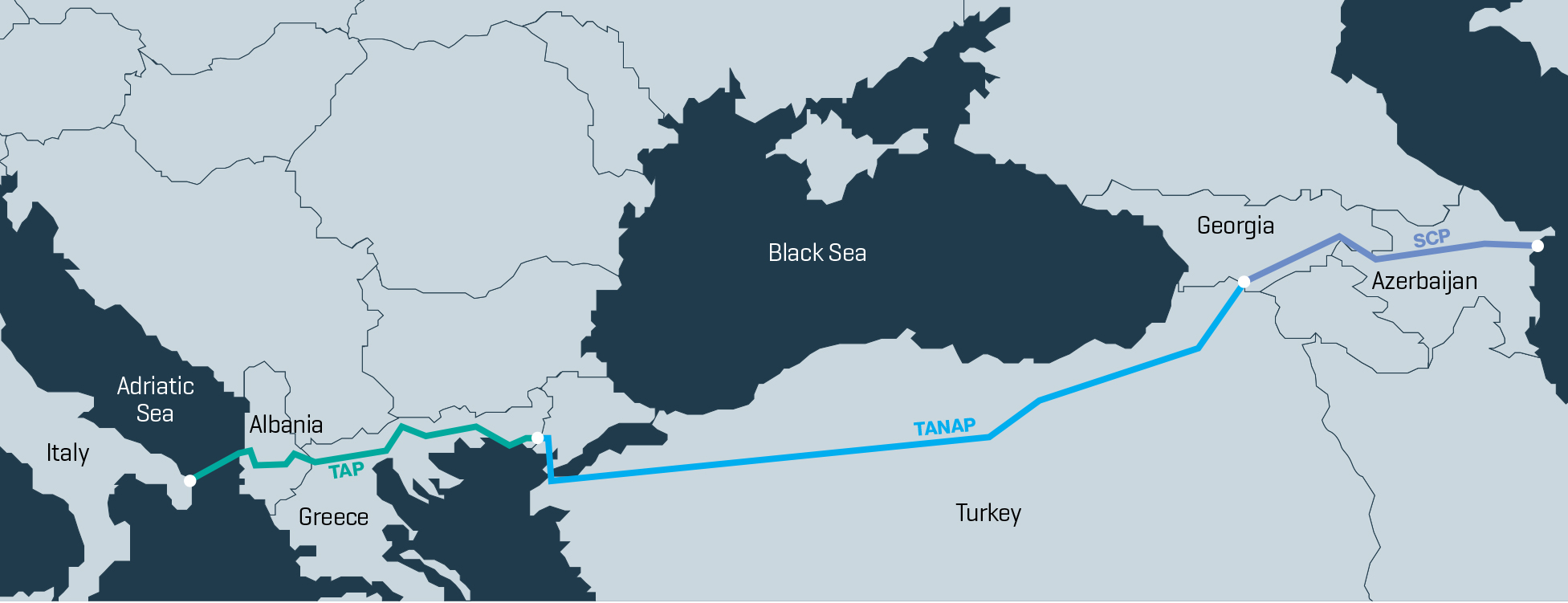“Shaping the age of gas” – how the EU is locking in a destructive path

Bankwatch Mail | 17 December 2015
As efforts to realise a mega gas pipeline along the Southern Gas Corridor intensify, Re:Common’s Elena Gerebizza explains how democratic rights are at stake – and are being trampled on.
This article is from Issue 63 of our quarterly newsletter Bankwatch Mail
Browse all articles on the right
In early June 2015, the CEO of oil giant BP, Bob Dudley, gave a remarkable speech at the World Gas Conference in Paris. He presented a new role for oil multinationals such as BP in “shaping the age of gas”. His argument is to convince the world, starting from Europe, that gas is the cleanest fossil fuel, and it has a major role in the energy transition that would save the climate. This is how oil corporations were preparing for the climate discussions in Paris. And this is how they framed the argument – “gas is the transition fuel” – which has been pushed for years in policy documents and transition scenarios from major environmental organisations.
This unhappy convergence of visions shares the approach of looking at the planet as a connection of maps, numbers, resources and CO2 molecules, rather than a place where humans, as a part of ‘nature’, have been living for centuries. The same approach describes ‘nature’ as something rather out there that should be eventually ‘protected’, and not as the environment in which we live through a complex set of relations rooted in many values that could be polarised around either exploitation or the commons.
In June when Dudley was speaking, I was getting ready to travel to Azerbaijan where BP has been operating since the mid-1990s, right after the small Caspian state’s independence from the former Soviet Union. As a result of BP’s operations, Azerbaijan is described as a key energy partner for European ‘energy security’. I was also in the country last year, and since then all the non-governmental organisations and independent media, with whom we’ve been in touch, have been shut down by the government.
Activists and journalists are mostly in jail on fabricated charges, or have escaped abroad. Emin Huseynov, journalist and founder of the Institute for Journalists Freedom and Safety, was hiding at the Swiss embassy in Baku for ten months before leaving the country under the diplomatic protection of the Swiss government in June this year.
Azerbaijan is a country with over 100 political prisoners, including very young activists whose crime was to call for freedom of expression on a Facebook page. The economy of the country is directly or indirectly controlled by the ruling family, the Aliyevs, in power since independence in 1991. The people of Azerbaijan are looking for spaces and opportunities to raise their voices and continue to call on the EU to support their demands for respecting basic freedoms in the country.
They object to every new economic deal with other countries reinforcing the power of the ruling family, as well as repression against every remaining free voice. They use words such as ‘corruption’ and ‘rights’, but not ‘infrastructure’ or ‘climate change’.
The EU and BP’s mega pipeline ‘project of common interest’
The EU and BP describe the mega gas pipeline that will connect Azerbaijan to Europe as a ‘project of common interest’, strategic for EU ‘energy security’.
This is potentially the largest project ever built between Europe and a neighbouring country: it carries an estimated price tag of EUR 45 billion and is set to involve more than 3,500 kilometres of pipeline to be built between the western coast of the Caspian sea in Azerbaijan, and the south-eastern coast of Italy, in one of the few remaining pristine marine areas in Apulia. On its way it would pass through Georgia, Turkey, Greece and Albania.
Read also
Europe’s Caspian gas dreams – a nightmare come true for human rights in Azerbaijan
Blog post | May 14, 2015
Energy security for Europe or profit for Lukoil?
Blog post | December 4, 2014
Pipe dreams – why public subsidies for Lukoil in Azerbaijan will not reduce EU dependency on Russia
Publication | January 21, 2015
Southern Gas Corridor pipeline
Democracy undermined
Communities on the two ends of the pipeline are concerned for reasons more complex than purely environmental issues. Their concerns are rather focused democracy, whose principles have been torn apart to make space for the pipeline on its Italian end, and around basic freedoms and the right to speech on the Caspian side.
Since the intergovernmental agreements for the construction of the pipeline were signed in 2013, the Baku regime has felt politically covered to arrest every non-embedded voice in the country, to close every independent media and every international organisation in an effort to cut connections between civil society in the country with the rest of the world.
In Italy, the consultation on the pipeline project’s environmental impact assessment was flawed. Various government offices gave different opinions on the project. All the local administrations – from the municipality level to the province and region – rejected it and asked for alternatives that were never provided. However, the Italian government used its power to impose governmental decrees in order to make sure that the project received authorisation in April 2015.
“Europe is asking for this from us, this is a European priority” is the mantra that government officials have consistently repeated. When the EU declares that projects of ‘common interest’ cannot be stopped on environmental grounds, this is what happens, despite the environmental violations and the broader set of fundamental human rights abuses.
EU billions for big infrastructure, above the heads of people
This situation is far from unique; unfortunately, it is rather common. The current European Commission, in office since November 2014, has promoted a massive investment plan on large infrastructure as a key tool for economic recovery in the EU. A plan worth EUR 315 billion, most of it is oriented to finance the Southern Gas Corridor and similar projects, some of them beyond the EU’s borders. Gas storage facilities, LNG plants, highways, high-speed railways and electricity interconnectors are the main investments, decided somewhere between capitals and Brussels, above the heads of people.
Yet, thousands of people will see the construction of such projects happening in their houses, their fields, their mountains and their forests, their beaches and the seas where they live and which they depend on. The ‘superior interest’ from such an investment agenda is not serving the interests of the people. And it is not in line with any fight to address climate change.
Guaranteeing common returns for some
It is rather in the interest of investors and corporate players, themselves more and more dependent on financial markets and now reorganised to make money through the further extraction of wealth – financial and physical – from territories and their local communities.
The Southern Gas Corridor, and the many other projects of ‘common interest’, will likely be a driver for expropriation in Europe and beyond, and too for the reinforcement of financial and state power, which are also becoming actors of repression with the main task to make sure that all ‘strategic’ infrastructure is built.
The financial instruments that the president of the European Commission, Jean-Claude Juncker, and the European Investment Bank are proposing – namely European project bonds – aim to allow BP and the other corporations involved in the construction of the Gas Corridor to leverage money directly on financial markets, using EU resources to improve the rating of the bonds which pension funds and investors will then buy. Through this system, a revenue stream is created, on which new financial assets are built – assets which will ultimately guarantee a rent to investors. This of course means more money to those intent on locking in a fossil fuel economy and a system of ever-growing accumulation.
This is part of what oil and gas corporations mean when they talk about “shaping the age of gas”: how to make extra profits for them and investors via the further exploitation of fossil fuels. This is also part of how Europe and other societies are being reshaped, to allow further extraction of wealth in every possible sphere of our lives and for the advantage of the few – what some refer to as the ‘financialisation’ of the economy and society at large. There is no space or will in the closed rooms of UN climate conferences to discuss – not to say understand – the complex power relations that are reshaping society in its entirety.
It is up to communities and movements to challenge this new paradigm before it is too late.
This article was first published in the compendium ‘Paths Beyond Paris: Movements, action and solidarity towards Climate Justice’ (pdf)
Theme: Energy & climate | Social & economic impacts
Location: Azerbaijan | Italy
Project: Southern Gas Corridor / Euro-Caspian Mega Pipeline
Tags: BW Mail 63 | Shah Deniz | Southern Gas Corridor | TANAP | TAP | gas | human rights | repression
Never miss an update
We expose the risks of international public finance and bring critical updates from the ground. We believe that the billions of public money should work for people and the environment.
STAY INFORMED

